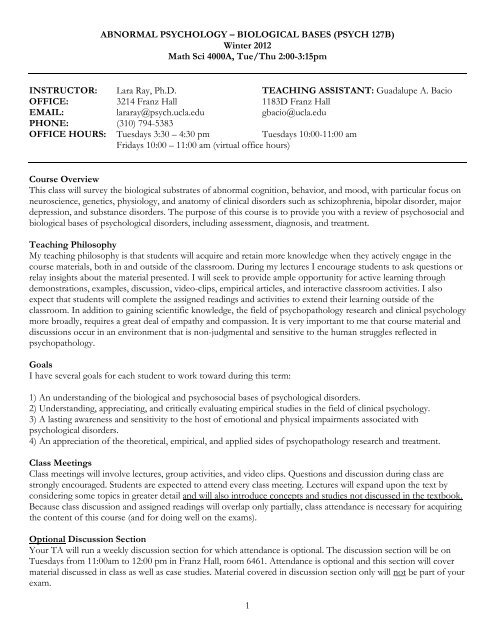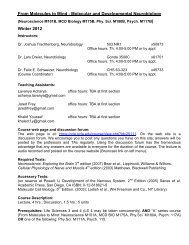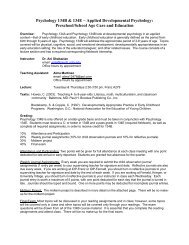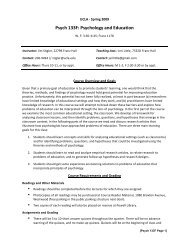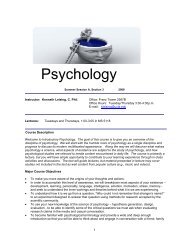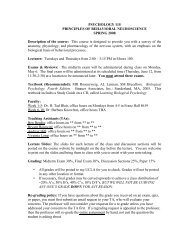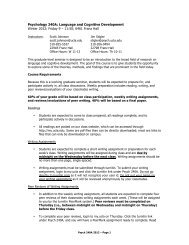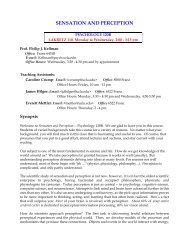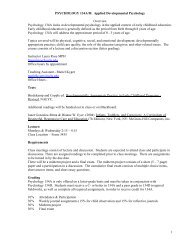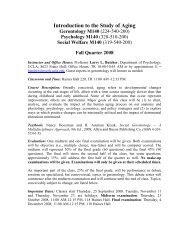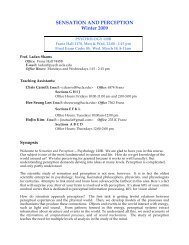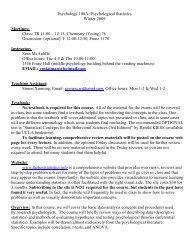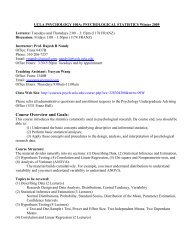Syllabus - Courses in Psychology - UCLA
Syllabus - Courses in Psychology - UCLA
Syllabus - Courses in Psychology - UCLA
You also want an ePaper? Increase the reach of your titles
YUMPU automatically turns print PDFs into web optimized ePapers that Google loves.
ABNORMAL PSYCHOLOGY – BIOLOGICAL BASES (PSYCH 127B)<br />
W<strong>in</strong>ter 2012<br />
Math Sci 4000A, Tue/Thu 2:00-3:15pm<br />
INSTRUCTOR: Lara Ray, Ph.D. TEACHING ASSISTANT: Guadalupe A. Bacio<br />
OFFICE: 3214 Franz Hall 1183D Franz Hall<br />
EMAIL: lararay@psych.ucla.edu gbacio@ucla.edu<br />
PHONE: (310) 794-5383<br />
OFFICE HOURS: Tuesdays 3:30 – 4:30 pm Tuesdays 10:00-11:00 am<br />
Fridays 10:00 – 11:00 am (virtual office hours)<br />
Course Overview<br />
This class will survey the biological substrates of abnormal cognition, behavior, and mood, with particular focus on<br />
neuroscience, genetics, physiology, and anatomy of cl<strong>in</strong>ical disorders such as schizophrenia, bipolar disorder, major<br />
depression, and substance disorders. The purpose of this course is to provide you with a review of psychosocial and<br />
biological bases of psychological disorders, <strong>in</strong>clud<strong>in</strong>g assessment, diagnosis, and treatment.<br />
Teach<strong>in</strong>g Philosophy<br />
My teach<strong>in</strong>g philosophy is that students will acquire and reta<strong>in</strong> more knowledge when they actively engage <strong>in</strong> the<br />
course materials, both <strong>in</strong> and outside of the classroom. Dur<strong>in</strong>g my lectures I encourage students to ask questions or<br />
relay <strong>in</strong>sights about the material presented. I will seek to provide ample opportunity for active learn<strong>in</strong>g through<br />
demonstrations, examples, discussion, video-clips, empirical articles, and <strong>in</strong>teractive classroom activities. I also<br />
expect that students will complete the assigned read<strong>in</strong>gs and activities to extend their learn<strong>in</strong>g outside of the<br />
classroom. In addition to ga<strong>in</strong><strong>in</strong>g scientific knowledge, the field of psychopathology research and cl<strong>in</strong>ical psychology<br />
more broadly, requires a great deal of empathy and compassion. It is very important to me that course material and<br />
discussions occur <strong>in</strong> an environment that is non-judgmental and sensitive to the human struggles reflected <strong>in</strong><br />
psychopathology.<br />
Goals<br />
I have several goals for each student to work toward dur<strong>in</strong>g this term:<br />
1) An understand<strong>in</strong>g of the biological and psychosocial bases of psychological disorders.<br />
2) Understand<strong>in</strong>g, appreciat<strong>in</strong>g, and critically evaluat<strong>in</strong>g empirical studies <strong>in</strong> the field of cl<strong>in</strong>ical psychology.<br />
3) A last<strong>in</strong>g awareness and sensitivity to the host of emotional and physical impairments associated with<br />
psychological disorders.<br />
4) An appreciation of the theoretical, empirical, and applied sides of psychopathology research and treatment.<br />
Class Meet<strong>in</strong>gs<br />
Class meet<strong>in</strong>gs will <strong>in</strong>volve lectures, group activities, and video clips. Questions and discussion dur<strong>in</strong>g class are<br />
strongly encouraged. Students are expected to attend every class meet<strong>in</strong>g. Lectures will expand upon the text by<br />
consider<strong>in</strong>g some topics <strong>in</strong> greater detail and will also <strong>in</strong>troduce concepts and studies not discussed <strong>in</strong> the textbook.<br />
Because class discussion and assigned read<strong>in</strong>gs will overlap only partially, class attendance is necessary for acquir<strong>in</strong>g<br />
the content of this course (and for do<strong>in</strong>g well on the exams).<br />
Optional Discussion Section<br />
Your TA will run a weekly discussion section for which attendance is optional. The discussion section will be on<br />
Tuesdays from 11:00am to 12:00 pm <strong>in</strong> Franz Hall, room 6461. Attendance is optional and this section will cover<br />
material discussed <strong>in</strong> class as well as case studies. Material covered <strong>in</strong> discussion section only will not be part of your<br />
exam.<br />
1
Textbook & Assigned Read<strong>in</strong>gs for this Course<br />
Text: Kr<strong>in</strong>g, Johnson, Davidson & Neale (2010). Abnormal <strong>Psychology</strong>. John Wiley & Sons, Inc. Eleventh Edition.<br />
Hoboken, NJ (referred to as Kr<strong>in</strong>g <strong>in</strong> the read<strong>in</strong>g schedule).<br />
The Case Studies companion to your textbook will be used dur<strong>in</strong>g the Optional Discussion Section.<br />
Read<strong>in</strong>gs: A selection of research articles for this class has been posted on the course website. Students may<br />
download and pr<strong>in</strong>t each required article directly from the website.<br />
The read<strong>in</strong>g schedule is provided <strong>in</strong> ‘Course Outl<strong>in</strong>e’ <strong>in</strong> this syllabus.<br />
Grad<strong>in</strong>g<br />
The follow<strong>in</strong>g assignments will determ<strong>in</strong>e your grade: Three Exams (30% each) plus Manuscript Review (10%).<br />
The po<strong>in</strong>t breakdown to be used for grad<strong>in</strong>g is the follow<strong>in</strong>g:<br />
A = 100-94; A-= 93-90; B+ = 89-87; B = 86-84; B- = 83-80; C+ = 79-77; C = 76-74; C- = 73-70; D+ = 69-67;<br />
D = 66-64; D- = 63-60; F = < 60<br />
There is no curve. This means that everyone <strong>in</strong> the class could potentially get As and Bs.<br />
Exams<br />
There will be three exams (each will be worth 30% of your f<strong>in</strong>al grade). The format of the exams will be multiple<br />
choice questions. All material discussed <strong>in</strong> class (<strong>in</strong>clud<strong>in</strong>g lectures, videos, and exercises) as well as all materials <strong>in</strong><br />
the assigned read<strong>in</strong>gs is fair game for exams. Exams focus on conceptual understand<strong>in</strong>g and application rather than<br />
on rote memorization. The exams are not cumulative.<br />
Exam scores will be posted onl<strong>in</strong>e. However, I cannot allow you to keep the exams. I put a lot of effort <strong>in</strong>to<br />
design<strong>in</strong>g the exams used <strong>in</strong> this course and I may use some of the same questions <strong>in</strong> future exams. The teach<strong>in</strong>g<br />
assistant will keep the exams and answer sheets. If you want to see your exam aga<strong>in</strong> or look at it for an extended<br />
period of time then you will want to visit the teach<strong>in</strong>g assistant dur<strong>in</strong>g office hours.<br />
The research articles compiled for the course will be used for test purposes only to the extent that the material from<br />
the research article is presented <strong>in</strong> lecture. You will be asked to read the research articles <strong>in</strong> order to complete the<br />
manuscript review and the extra-credit assignment (should you choose to complete the extra credit). At this level <strong>in</strong><br />
your college career it is very important that you be able to read and evaluate empirical sources directly, as opposed<br />
to depend<strong>in</strong>g solely on textbooks.<br />
Make-up exam policy: I do not give makeup exams. Make sure that you do not schedule your travel<br />
dur<strong>in</strong>g exams. Students who do not take an exam will receive 0 po<strong>in</strong>ts for that exam. For extenuat<strong>in</strong>g circumstances,<br />
such as a death <strong>in</strong> the family or other emergency situation, I will allow a make-up exam with documentation of this<br />
event. Please note that documentation is required at least 24-hours before the day of the exam. If for some reason<br />
you cannot provide documentation before the exam, then you must contact Professor Ray with<strong>in</strong> 24-hours after the<br />
exam. If you miss the exam and fail to contact the <strong>in</strong>structor with<strong>in</strong> this time period, you will not be allowed to take<br />
a make-up exam under any circumstances. If for some reason you do end up tak<strong>in</strong>g a make-up exam, the <strong>in</strong>structor<br />
reserves to right to create a new exam for you, which may be <strong>in</strong> the form of an essay test. There is absolutely no make<br />
up to extra credit assignments.<br />
About show<strong>in</strong>g up late for an exam: Do not be late for an exam. If you arrive after someone else has<br />
already f<strong>in</strong>ished the test and left the room, you will not be allowed to take the exam.<br />
2
Manuscript Review<br />
You will be asked to write a 1-2 page (s<strong>in</strong>gle-spaced, 12 font) critical review of a manuscript provided by the<br />
<strong>in</strong>structor. This assigned is designed to mirror the “peer-review” of scientific manuscripts. Therefore you must<br />
complete the follow<strong>in</strong>g steps: (1) provide a brief review of the manuscript; (2) briefly describe the study scientific<br />
methodological strengths; (3) provide an <strong>in</strong>-depth discussion of the study’s weaknesses, <strong>in</strong>clud<strong>in</strong>g major and m<strong>in</strong>or<br />
problems; and (4) provide recommendations for change. The manuscript review will be worth 10% of your f<strong>in</strong>al<br />
grade. You cannot turn <strong>in</strong> your manuscript review late and you cannot make it up. There are no exceptions.<br />
Extra Credit<br />
You can earn up to 5 extra credit po<strong>in</strong>ts for the course. You can earn 2 po<strong>in</strong>ts for class participation us<strong>in</strong>g the<br />
i>clicker response system and up to 3 po<strong>in</strong>ts for summariz<strong>in</strong>g research articles. See details below:<br />
1) Students who respond to ≥ 70% of the i>clicker questions posed <strong>in</strong> lecture (regardless of whether their answer<br />
was correct) will be given an extra 2 po<strong>in</strong>ts for attendance and participation. This is an “all-or-noth<strong>in</strong>g” task. Please<br />
be sure that you register your i>clicker and beware that respond<strong>in</strong>g for a friend/classmate us<strong>in</strong>g his/her clicker<br />
constitutes academic dishonesty and will be treated as such.<br />
2) For additional extra credit students may summarize a research article from the course website. You can earn 0.5<br />
extra credit po<strong>in</strong>t for each research article summary you submit (up to 3 total extra credit po<strong>in</strong>ts – equivalent to 6<br />
articles maximum). To get the extra po<strong>in</strong>t on your f<strong>in</strong>al exam your article summary must:<br />
• Be typed<br />
• Be 1 page long (s<strong>in</strong>gle-spaced, 12-font)<br />
• Provide a brief summary of the article <strong>in</strong>clud<strong>in</strong>g background, method, and results<br />
• Describe (<strong>in</strong> your own words) what you learned from the article<br />
Please note that plagiarism will not be tolerated. You must describe the article <strong>in</strong> your own words. Please do not<br />
attempt to reword the article abstract for these summaries; that will not be permitted. It is important that you<br />
convey your own critical understand<strong>in</strong>g of the research article.<br />
Disabilities<br />
I encourage students with disabilities (physical, learn<strong>in</strong>g, and/or psychiatric) to discuss with me at the beg<strong>in</strong>n<strong>in</strong>g of<br />
the course appropriate accommodation that might be helpful to you. Additionally, students should consider<br />
contact<strong>in</strong>g appropriate university resources. Information regard<strong>in</strong>g disabilities is confidential.<br />
Honor Code<br />
My <strong>in</strong>teractions with you are based on the expectation of mutual trust and honor. You are required to do your own<br />
work on exams, papers, and article summaries. Please note that exams may not be removed from the exam room or<br />
copied at any time. Consistent with University policy, cheat<strong>in</strong>g is not tolerated. Us<strong>in</strong>g the i-cliker to respond for a friend is<br />
equivalent to cheat<strong>in</strong>g and will be treated as such. Anyone caught cheat<strong>in</strong>g on an exam or plagiariz<strong>in</strong>g the work of others<br />
will be dismissed from the course with a fail<strong>in</strong>g grade. I will then take actions to encourage the fullest of University<br />
sanctions, mean<strong>in</strong>g expulsion.<br />
Disclaimer<br />
For unforeseen reasons, it sometimes becomes necessary to adjust the syllabus and/or schedule. Although I will try<br />
to follow the format and scheduled presented with<strong>in</strong> this syllabus as closely as possible, I reserve the right to make<br />
alterations I deem necessary.<br />
3
COURSE OUTLINE<br />
Date Lecture Topic Assignment due that day<br />
Week 1 Tuesday 1/10 Introduction to the course<br />
Thursday 1/12 Psychiatric Diagnosis and Nosology Kr<strong>in</strong>g Chapter 3<br />
Kr<strong>in</strong>g Chapter 2<br />
Week 2 Tuesday 1/17 Genetic Bases of Behavior<br />
Caspi et al. (2003)<br />
Thursday 1/19 Neural Bases of Behavior Kr<strong>in</strong>g Chapter 2<br />
Kr<strong>in</strong>g Chapter 5<br />
Week 3 Tuesday 1/24 Anxiety Disorders<br />
Craske et al. (2009)<br />
Thursday 1/26 Anxiety Disorders Kr<strong>in</strong>g Chapter 5<br />
Week 4 Tuesday 1/31 ***EXAM #1*** ***EXAM #1***<br />
Thursday 2/2 Mood Disorders Kr<strong>in</strong>g Chapter 8<br />
Week 5 Tuesday 2/7 Mood Disorders (Dr. Miklowitz)<br />
Article Review Due<br />
Kr<strong>in</strong>g Chapter 8<br />
Thursday 2/9 Mood Disorders<br />
Kr<strong>in</strong>g Chapter 8<br />
Hammen (2009)<br />
Week 6 Tuesday 2/14 Substance Use Disorders Kr<strong>in</strong>g Chapter 10<br />
Kr<strong>in</strong>g Chapter 10<br />
Thursday 2/16 Substance Use Disorders<br />
Ray et al. (2010a)<br />
Week 7 Tuesday 2/21 Eat<strong>in</strong>g Disorders Kr<strong>in</strong>g Chapter 9<br />
Thursday 2/23 ***EXAM #2*** ***EXAM #2***<br />
Week 8 Tuesday 2/28 Schizophrenia Kr<strong>in</strong>g Chapter 11<br />
Thursday 3/1 Schizophrenia<br />
Kr<strong>in</strong>g Chapter 11<br />
Cannon (2010)<br />
Week 9 Tuesday 3/6 Treatment – Psychotherapy<br />
Kr<strong>in</strong>g Chapter 16<br />
Extra Credit Due<br />
Thursday 3/8 Treatment – Psychotherapy Kr<strong>in</strong>g Chapter 16<br />
Week 10 Tuesday 3/13 Treatment – Pharmacotherapy (Dr. Miotto) Ray et al. (2010b)<br />
Thursday 3/15 ***EXAM #3*** ***EXAM #3***<br />
4


